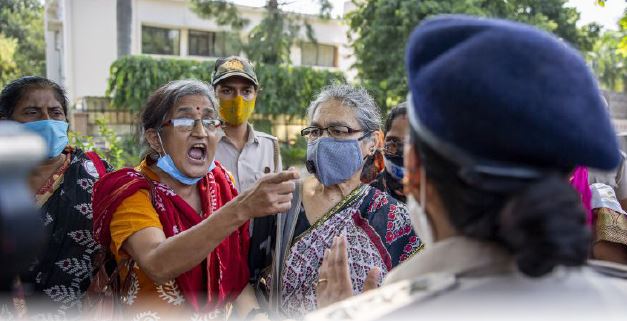NEW DELHI—The gang rape and death of a woman from the lowest rung of India’s caste system sparked outrage across the country in late September, with several politicians and activists demanding justice and protesters rallying in the streets.
The attack of the 19-yearold is the latest gruesome case of sexual violence against women to rile India, where reports of rape are hauntingly familiar.
The victim, who belonged to the Dalit community, was raped by four men on Sept. 14 in the heartland state of Uttar Pradesh’s Hathras district. The woman’s family told local media that they found her naked, bleeding and paralyzed with a split tongue and a broken spine in a field outside their home. She died two weeks later, after battling serious injuries in a hospital in New Delhi.
Police said the four men, all from an upper caste, have been arrested.
Uttar Pradesh’s chief minister, Yogi Adityanath, ordered a special investigation team to handle the case and said it will be tried in a fast-track court.
In New Delhi, police detained several female activists after they tried to march in the street shouting slogans against Mr. Adityanath and Prime Minister Narendra Modi. The demonstrators carried placards that read, “Stop rape culture.”
Maimoona Mullah of the All India Democratic Women’s Association said Uttar Pradesh, which is ruled by Modi’s Bharatiya Janata Party and ranks as the most unsafe state for women in the country, had become the “rape state of India.”
“We do not accept rape culture in the name of new India,” Ms. Mullah said.
Earlier, hundreds of protesters from the Bhim Army, a party championing the rights of Dalits, thronged the hospital premises in New Delhi and jostled with police. Party leader Chandra Shekhar Aazad urged Dalits across the country to flood the streets to demand that the perpetrators be hanged.
Dalits—formerly known as “untouchables” and at the bottom of India’s unforgiving Hindu caste hierarchy—are victims of thousands of attacks each year. According to human rights organizations, Dalit women are particularly vulnerable to caste-based discrimination and sexual violence.
According to an article by Soutik Biswas titled, “Hathras case: Dalit women are among the most oppressed in the world,” published on bbc.com, Dalit women in rural India have been victims of sexual violence for a long time. “In these regions, much of the land, resources and social power remain with the upper and middle castes. Despite a 1989 law to prevent atrocities against the community, there was no let-up in violence against Dalit women. They continue to be stalked, abused, molested, raped and murdered with impunity,” wrote Mr. Biswas.
He referenced a 2006 study of 500 Dalit women in four states across India on the forms of violence they had faced. Fifty-four percent had been physically assaulted; 46 percent had been sexually harassed; 43 percent had faced domestic violence; 23 percent had been raped; and 62 percent had been verbally abused,” noted Mr. Biswas.

“And Dalit women bear the brunt of violence of all castes, including their own. The Centre for Dalit Rights group examined 100 incidents of sexual violence against Dalit women and girls across 16 districts in India between 2004 and 2013. It found that 46 percent of the victims were aged below 18 and 85 percent were less than 30 years old. The perpetrators of the violence came from 36 different castes, including Dalit,” wrote Mr. Biswas.
In August, a 13-year-old Dalit girl was raped and killed in Uttar Pradesh. In December last year, a 23-year-old Dalit woman in the same state died after being set ablaze by a gang of men as she made her way to court to press rape charges. Both cases are pending in court.
In India, rape and sexual violence have been under the spotlight since the 2012 gang rape and killing of a 23-year-old student on a New Delhi bus. The attack galvanized massive protests and inspired lawmakers to order the creation of fast-track courts dedicated to rape cases and stiffen penalties for those convicted of the crime.
In March, four men sentenced to death for the 2012 attack were hanged.
Indians often rally for swift justice in a country where a woman is raped every 15 minutes, according to government data, and sentencing is notoriously delayed by backlogged courts.
According to the government, police registered 33,658 cases of rape in 2017—an average of 92 per day and a 35 percent jump from 2012. About 10,000 of the reported victims were children. The real figure is believed to be far higher due to the stigma of sexual violence. According to the International Dalit Solidarity Network, “sanctioned impunity on behalf of the offenders is a key problem. Police often neglect or deny the Dalit women of their right to seek legal and judicial aid. In many cases, the judiciary fails to enforce the laws that protect Dalit women from discrimination.” (Associated Press. Final Call staff contributed to this report.)













